Deck 2: The Study of Learning and Behavior
Question
Question
Question
Question
Question
Question
Question
Question
Question
Question
Question
Question
Question
Question
Question
Question
Question
Question
Question
Question
Question
Question
Question
Question
Question
Question
Question
Question
Question
Question
Question
Question
Question
Question
Question
Question
Question
Question
Question
Question
Question

Unlock Deck
Sign up to unlock the cards in this deck!
Unlock Deck
Unlock Deck
1/41
Play
Full screen (f)
Deck 2: The Study of Learning and Behavior
1
Using an ABA reversal design is rather like using a ______.
A) dust mop
B) fountain pen
C) light switch
D) barber's chair
A) dust mop
B) fountain pen
C) light switch
D) barber's chair
C
2
The kind of study that is most likely to involve a large number of subjects is one with a ________.
A) between-subjects design
B) within-subject design
C) ABA design
D) matched sample
A) between-subjects design
B) within-subject design
C) ABA design
D) matched sample
A
3
The figure below shows the results of an experiment comparing the effects of two teaching methods. Phyllis was taught by method A; Gertrude was taught by method B. This study is an example of _______. 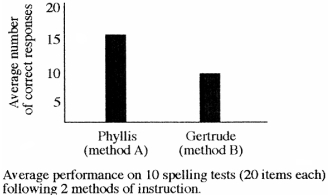
A) a between-subjects design
B) a within-subject design
C) random assignment
D) yoked control

A) a between-subjects design
B) a within-subject design
C) random assignment
D) yoked control
A
4
Harry teaches an advanced painting class. His goal is to teach students to paint more creatively. Harry will probably measure learning as a change in response _________.
A) topography
B) intensity
C) speed
D) rate
A) topography
B) intensity
C) speed
D) rate

Unlock Deck
Unlock for access to all 41 flashcards in this deck.
Unlock Deck
k this deck
5
The figure below shows the results of an experiment on the effects of heat on aggressive social behavior. Each rat experienced three temperatures. There was a sharp increase in the rate of aggressive behavior in all rats when the temperature went above 90. This study is best described as ________. 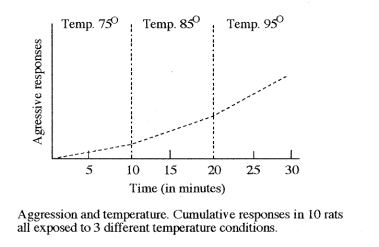
A) a between-subjects experiment
B) a within-subject experiment
C) a case study
D) anecdotal evidence

A) a between-subjects experiment
B) a within-subject experiment
C) a case study
D) anecdotal evidence

Unlock Deck
Unlock for access to all 41 flashcards in this deck.
Unlock Deck
k this deck
6
In a cumulative record, learning is indicated by a change in response _______.
A) topography
B) amplitude
C) speed
D) rate
A) topography
B) amplitude
C) speed
D) rate

Unlock Deck
Unlock for access to all 41 flashcards in this deck.
Unlock Deck
k this deck
7
In group-design experiments, researchers often use _________ to reduce differences among participants.
A) clones
B) statistics
C) DNA matching
D) matched sampling
A) clones
B) statistics
C) DNA matching
D) matched sampling

Unlock Deck
Unlock for access to all 41 flashcards in this deck.
Unlock Deck
k this deck
8
A person who says, "Everyone knows that...." is referring to _______.
A) anecdotal evidence
B) case study evidence
C) descriptive research evidence
D) experimental research evidence
A) anecdotal evidence
B) case study evidence
C) descriptive research evidence
D) experimental research evidence

Unlock Deck
Unlock for access to all 41 flashcards in this deck.
Unlock Deck
k this deck
9
The figure below shows learning as a change in __________.
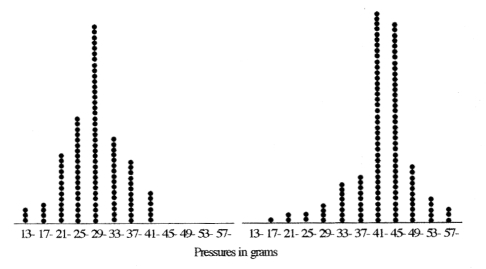
A) intensity
B) frequency
C) topography
D) speed

A) intensity
B) frequency
C) topography
D) speed

Unlock Deck
Unlock for access to all 41 flashcards in this deck.
Unlock Deck
k this deck
10
A teacher who looks for an increase in the number of correct performances per minute is using _______ as a measure of learning.
A) topography
B) speed
C) rate
D) fluency
A) topography
B) speed
C) rate
D) fluency

Unlock Deck
Unlock for access to all 41 flashcards in this deck.
Unlock Deck
k this deck
11
In within-subject experiments, each subject's performance is compared with his or her performance during a ______.
A) control period
B) random sampling period
C) baseline period
D) benchmark session
A) control period
B) random sampling period
C) baseline period
D) benchmark session

Unlock Deck
Unlock for access to all 41 flashcards in this deck.
Unlock Deck
k this deck
12
The figure below shows learning as a change in ___________. 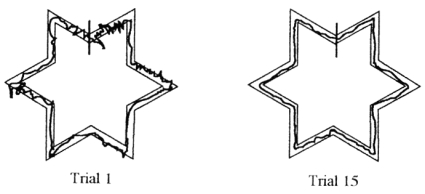
A) intensity
B) frequency
C) topography
D) redundancy

A) intensity
B) frequency
C) topography
D) redundancy

Unlock Deck
Unlock for access to all 41 flashcards in this deck.
Unlock Deck
k this deck
13
The kind of experiment that is most likely to require statistical analysis is a(n) _______.
A) between-subjects experiment
B) within-subject experiment
C) ABA experiment
D) descriptive study
A) between-subjects experiment
B) within-subject experiment
C) ABA experiment
D) descriptive study

Unlock Deck
Unlock for access to all 41 flashcards in this deck.
Unlock Deck
k this deck
14
Marjorie drives a school bus. Sometimes the kids get rather noisy. She decides to play music the kids like through speakers on the bus, but whenever the kids get too noisy she turns the music off. When they quiet down, she turns the music back on. In this way, she hopes to get the kids to make less noise. Marjorie is probably going to measure learning as a change in response _________.
A) topography
B) intensity
C) speed
D) rate
A) topography
B) intensity
C) speed
D) rate

Unlock Deck
Unlock for access to all 41 flashcards in this deck.
Unlock Deck
k this deck
15
Any variable that is allowed to vary freely is a(n) __________ variable.
A) autonomous
B) dependent
C) independent
D) synchronous
A) autonomous
B) dependent
C) independent
D) synchronous

Unlock Deck
Unlock for access to all 41 flashcards in this deck.
Unlock Deck
k this deck
16
Experiments done in natural settings are called _______.
A) natural experiments
B) spontaneous experiments
C) unplanned experiments
D) field experiments
A) natural experiments
B) spontaneous experiments
C) unplanned experiments
D) field experiments

Unlock Deck
Unlock for access to all 41 flashcards in this deck.
Unlock Deck
k this deck
17
The person who suggested that to learn how nature works, we must "sit down before fact as a little child," and "be prepared to give up every preconceived notion" was ______.
A) Charles Darwin
B) T. H. Huxley
C) E. L. Thorndike
D) John B. Watson
A) Charles Darwin
B) T. H. Huxley
C) E. L. Thorndike
D) John B. Watson

Unlock Deck
Unlock for access to all 41 flashcards in this deck.
Unlock Deck
k this deck
18
Any variable an experimenter manipulates is a(n) ________ variable.
A) autonomous
B) dependent
C) independent
D) synchronous
A) autonomous
B) dependent
C) independent
D) synchronous

Unlock Deck
Unlock for access to all 41 flashcards in this deck.
Unlock Deck
k this deck
19
In the cumulative record below, the rate of behavior is ________. 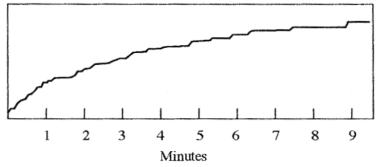
A) increasing
B) decreasing
C) stable
D) fluctuating wildly

A) increasing
B) decreasing
C) stable
D) fluctuating wildly

Unlock Deck
Unlock for access to all 41 flashcards in this deck.
Unlock Deck
k this deck
20
The first person to use a single-subject reversal design was probably ____________.
A) Aardvark
B) Darwin
C) Galen
D) Malthus
A) Aardvark
B) Darwin
C) Galen
D) Malthus

Unlock Deck
Unlock for access to all 41 flashcards in this deck.
Unlock Deck
k this deck
21
One highly readable little book on research methods mentioned in your text is called _________.
A) The Idiot's Guide to Behavioral Research
B) Research Made Simple
C) Psychological Research: An Introduction
D) Random Designs
A) The Idiot's Guide to Behavioral Research
B) Research Made Simple
C) Psychological Research: An Introduction
D) Random Designs

Unlock Deck
Unlock for access to all 41 flashcards in this deck.
Unlock Deck
k this deck
22
Experimental research on behavior is often said to be artificial. To compensate for this problem, researchers do ________ .
A) field experiments
B) open-ended research
C) follow-up studies
D) free sampling research
A) field experiments
B) open-ended research
C) follow-up studies
D) free sampling research

Unlock Deck
Unlock for access to all 41 flashcards in this deck.
Unlock Deck
k this deck
23
Research results with humans usually parallel those with animals.
Completion
Completion

Unlock Deck
Unlock for access to all 41 flashcards in this deck.
Unlock Deck
k this deck
24
A flat cumulative record indicates that the behavior is ________.

Unlock Deck
Unlock for access to all 41 flashcards in this deck.
Unlock Deck
k this deck
25
One problem with computer simulations as a substitute for animal research is that ___________.
A) they are terribly expensive
B) they take years to develop
C) "bugs" in the software distort the findings
D) no one knows what behavior to program until the research has been done
A) they are terribly expensive
B) they take years to develop
C) "bugs" in the software distort the findings
D) no one knows what behavior to program until the research has been done

Unlock Deck
Unlock for access to all 41 flashcards in this deck.
Unlock Deck
k this deck
26
Discuss the various ways of measuring learning.

Unlock Deck
Unlock for access to all 41 flashcards in this deck.
Unlock Deck
k this deck
27
Explain how a cumulative recorder works.

Unlock Deck
Unlock for access to all 41 flashcards in this deck.
Unlock Deck
k this deck
28
A cumulative record shows the total number of responses that have occurred in a given period of time as well as the rate at which they occurred.

Unlock Deck
Unlock for access to all 41 flashcards in this deck.
Unlock Deck
k this deck
29
B. F. Skinner was the first person to record data cumulatively.

Unlock Deck
Unlock for access to all 41 flashcards in this deck.
Unlock Deck
k this deck
30
Your text describes four basic sources of evidence: anecdotal, case study, descriptive study, experimental study. The least reliable of these is ______.

Unlock Deck
Unlock for access to all 41 flashcards in this deck.
Unlock Deck
k this deck
31
Explain the difference between within-subject and between-subjects experiments.

Unlock Deck
Unlock for access to all 41 flashcards in this deck.
Unlock Deck
k this deck
32
An_____________ is something an organism tries to escape or avoid.
A) adenoid
B) adhesive
C) adversive
D) aversive
A) adenoid
B) adhesive
C) adversive
D) aversive

Unlock Deck
Unlock for access to all 41 flashcards in this deck.
Unlock Deck
k this deck
33
A computer simulation that is useful for teaching certain principles of learning is called _________.
A) MacAnimal
B) Animal Trainer
C) Sniffy the Virtual Rat
D) Howard the Holographic Hog
A) MacAnimal
B) Animal Trainer
C) Sniffy the Virtual Rat
D) Howard the Holographic Hog

Unlock Deck
Unlock for access to all 41 flashcards in this deck.
Unlock Deck
k this deck
34
Response _______ refers to the time that passes before a response occurs.

Unlock Deck
Unlock for access to all 41 flashcards in this deck.
Unlock Deck
k this deck
35
Speed and rate are different terms for the same measure of learning.

Unlock Deck
Unlock for access to all 41 flashcards in this deck.
Unlock Deck
k this deck
36
A change in the form that behavior takes is called a change in ________.

Unlock Deck
Unlock for access to all 41 flashcards in this deck.
Unlock Deck
k this deck
37
Balster suggests that inhumane treatment of research animals is __________.
A) not good PR
B) expensive, in the long run
C) bad science
D) likely to result in litigation
A) not good PR
B) expensive, in the long run
C) bad science
D) likely to result in litigation

Unlock Deck
Unlock for access to all 41 flashcards in this deck.
Unlock Deck
k this deck
38
Explain why random assignment of subjects is unnecessary in ABA experiments.

Unlock Deck
Unlock for access to all 41 flashcards in this deck.
Unlock Deck
k this deck
39
One thing researchers can control better with animal subjects than with human subjects is _________.

Unlock Deck
Unlock for access to all 41 flashcards in this deck.
Unlock Deck
k this deck
40
The natural science approach assumes that things are caused only by natural events.

Unlock Deck
Unlock for access to all 41 flashcards in this deck.
Unlock Deck
k this deck
41
Discuss the ethics of using animals for research on learning.

Unlock Deck
Unlock for access to all 41 flashcards in this deck.
Unlock Deck
k this deck



